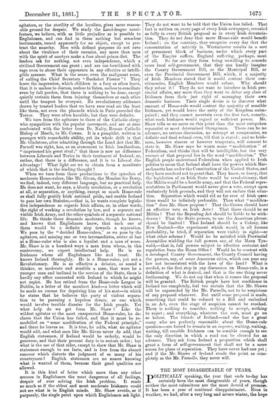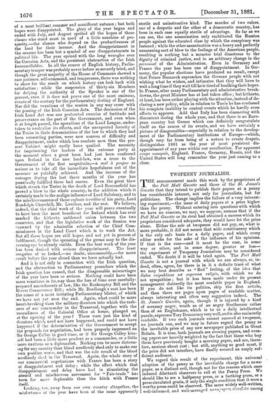THE MOST DISAGREEABLE OF YEARS.
POLITICALLY speaking, the year that ends to-day has certainly been the most disagreeable of years, theugh neither the most calamitous nor the most devoid of prows!). It has been a year of continual disappointment. Even in weather, we had, after a very long and severe winter, the hope
of a most brilliant summer and munificent autumn ; but both hopes were disappointed. The glory of the year began and ended with July, and August spoiled all the hopes of those classes who stood most in need of a little sunshine of pro- sperity,—the classes who depend on the productiveness of the land for their income. And the disappointment in the seasons has been but a symbol of our disappointments in political life. The year opened with the long wrangles over the Coercion Acts, and the persistent obstruction of the Irish Irreconcilables. In all the course of English history, Parlia- mentary temper was probably never before so severely tried, and though the great majority of the House of Commons showed a rare patience, self-command, and temperance, there was nothing to show for the result on which history can look back with satisfaction ; while the suspension of thirty-six Members for defying the authority of the Speaker is one of the gravest, even if it does not prove one of the most ominous, events of the century for the parliamentary destiny of England. Nor did the vexations of the session in any way cease with the passing of the Irish Coercion Acts. The discussion of the Irish Land Act was one protracted exercise of fortitude and perseverance on the part of the Government, and even when it at length passed, the operations of the Land League, under- taken to neutralise its effects, and the unexpected ferocity of the Tories in their denunciations of the law to which they had been consenting parties, were new sources of difficulty and disappointment, under which less resolute men than the pre- sent Cabinet might easily have quailed. The necessity for imprisoning the leaders of the extreme party at the moment when a great boon had just been conferred upon Ireland in the new land-law, was a cross to the Government of the first magnitude,—a mal a propos so serious as to take all the immediate hopefulness out of the measure so painfully achieved. And the increase of the outrages during the last three months of the year has punctually fulfilled these bad omens. Even the great blow which struck the Tories in the death of Lord Beaconsfield has proved a blow to the whole country, in the addition which it certainly made to the malign influence of Lord Salisbury, and to the mischievousness of those enfants terribles of his party, Lord Randolph Churchill, Mr. Lowther, and the rest. We believe, indeed, that the chief work of the year will prove eventually to have been the most beneficent for Ireland which has ever marked the hitherto unblessed union between the two countries, and that the legislative work of the Session was crowned by the admirable selection of the Chief Com- missioners in the Land Court which is to work the Act. But all these hopes are still hopes, and not yet in process of fulfilment, though the sprouting of the germs may to the dis- cerning eye be already visible. Even the best work of the year has been dashed with serious disappointment. The least sanguine of us looked,—no doubt, unreasonably,—for more result before the year closed than we have actually had.
And it is not only in connection with the Irish question, and the obstruction to Parliamentary procedure which the Irish question has caused, that the disagreeable miscarriages of the year have been so serious. Nothing could have been more vexatious in its.way than the loss of time over carefully- prepared amendments of law, like the Bankruptcy Bill and the Rivers Conservancy Bill ; while Mr. Bradlaugh's seat has been the cause of a most irritating Parliamentary blister, of which /we have not yet seen the end. Again, what could be more heart-breaking than the military disasters into which the rash- ness of our commander in the Transvaal, together with the unreadiness of the Colonial Office at home, plunged us, at the opening of the year? These were just the kind of disasters which need not have happened, and could not have happened if the determination of the Government to accept the proposals for negotiation, had been properly impressed on -Sir George Colley in good time, or if Sir George Colley him- self had been a little more prudent as a commander, or a little = more cautious as a diplomatist. Nothing can be more distress- ing for any country than blood needlessly shed only to make our own position wone, and that was the sole result of the blood needlessly shed in the Transvaal. Again, the whole story of our commercial negotiations with France has been a story of disappointment and delay ; while the effect which that disappointment and delay have had in stimulating the Absurd and mischievous movement for " Fair-trade " has been far more deplorable than the hitch with France Looking, too, away from our own country altogether, the misfortunes of the year have been of the same apparently sterile and uninstructive kind. The murder of two rulers, one of a despotic and the other of a democratic country, has been in each case equally sterile of advantage. So far as we can see, the one assassination only embittered the Russian people against the educated class by which the conspiracy was fostered ; while the other assassination was a heavy and perfectly unmeaning sort of blow to the feelings of the American people, resulting in nothing but a monster trial disastrous to the dignity of criminal justice, and in an arbitrary change in the personnel of the Administration. Even in Germany and France the year has been one of disappointment. In Ger- many, the popular elections have produced no result, except that Prince Bismarck reproaches the German people with not wishing what he wishes, and intimates that they will have to wait a long time if they wait till he is tired of baulking their hopes. In France, after many Parliamentary and administrative break- downs, the great Minister has at last taken office ; but hitherto, at least, has been rather playing with the situation, instead of de- claring a new policy, while in relation to Tunis he has confessed his complete inability to control events which he hardly even affects to approve. Add that Italy has been simmering with discontent during the whole year, and that there is no Euro- pean country but Greece which can definitely congratulate itself on the course of its events, and we have certainly a picture of disagreeables—especially in relation to the develop- ment of the Parliamentary institutions of Europe—which, though very far from being of a nature to create despair, distinguishes 1881 as the year of most persistent dis- appointment of any year within our recollection. For apparent coups mangues, England, France, Germany, Russia, and the United States will long remember the year just coming to a close.







































 Previous page
Previous page